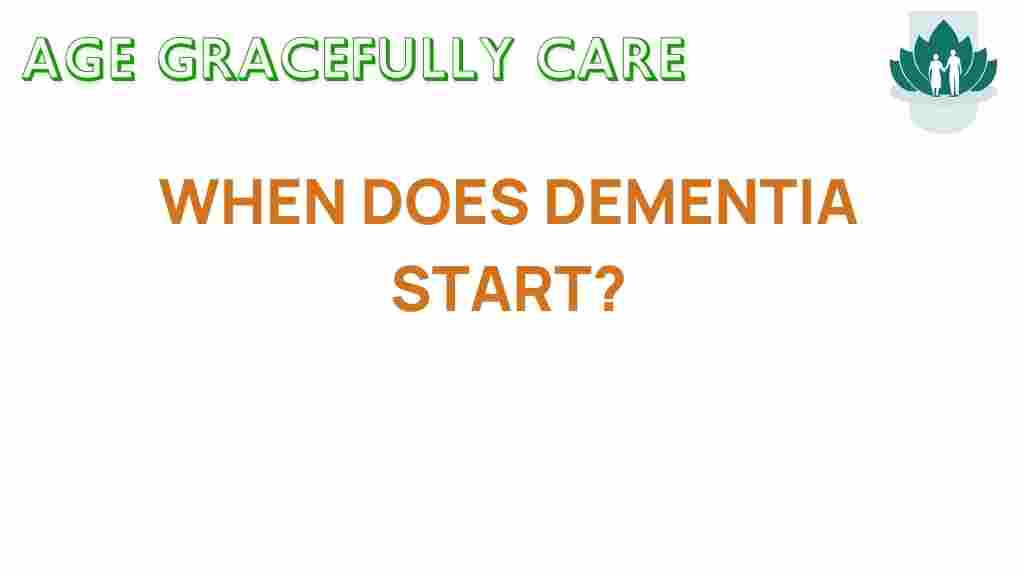Unraveling the Mystery: When Does Dementia Truly Begin?
Dementia is a term that encompasses a range of neurological disorders characterized by cognitive decline, affecting memory, thinking, and social abilities severely enough to interfere with daily life. Understanding when dementia truly begins is crucial for early intervention, which can significantly enhance the quality of life for individuals affected by this condition. In this article, we will explore the early signs of dementia, the risk factors associated with cognitive decline, and the importance of diagnosis and awareness.
Understanding Dementia and Cognitive Decline
Dementia is not a single disease but rather an umbrella term for various types of cognitive decline, including Alzheimer’s disease, vascular dementia, Lewy body dementia, and frontotemporal dementia. Each type has unique characteristics and underlying causes, but they all share common symptoms such as:
- Memory loss
- Difficulty in communication
- Challenges in problem-solving
- Disorientation to time and place
- Changes in mood and behavior
The onset of dementia is often gradual, making it challenging to pinpoint the exact moment it begins. Many individuals may experience mild cognitive impairment (MCI) before progressing to dementia, which makes awareness of early signs essential.
Early Signs of Dementia
Identifying the early signs of dementia can lead to timely diagnosis and treatment. Some early indicators include:
- Memory Loss: Frequent forgetfulness, such as misplacing items or forgetting names of familiar people.
- Difficulty Planning or Solving Problems: Struggling with tasks that require concentration, such as following a recipe or managing finances.
- Confusion with Time or Place: Losing track of dates, seasons, and the passage of time.
- Difficulty Completing Familiar Tasks: Trouble with daily activities, like driving to a familiar location.
- Changes in Mood and Personality: Experiencing mood swings, anxiety, or depression.
These early signs often go unnoticed or are attributed to normal aging. However, recognizing them can be a crucial step toward obtaining a diagnosis.
Risk Factors for Dementia
Several risk factors are associated with the development of dementia. Understanding these can help individuals take proactive measures to maintain cognitive health:
- Aging: The risk of dementia increases significantly as individuals age, particularly after the age of 65.
- Genetics: A family history of dementia can increase one’s risk due to inherited genetic factors.
- Cardiovascular Health: Conditions such as hypertension, diabetes, and high cholesterol can contribute to the risk of cognitive decline.
- Head Injuries: A history of traumatic brain injuries can lead to an increased risk of developing dementia.
- Smoking and Alcohol Use: Lifestyle choices such as smoking and excessive alcohol consumption can negatively impact brain health.
Diagnosis of Dementia
Diagnosing dementia involves a comprehensive assessment by a healthcare professional. The process typically includes:
- Medical History: Discussing symptoms and family history with a healthcare provider.
- Physical Examination: A thorough physical exam to rule out other conditions.
- Cognitive Testing: Assessing memory, problem-solving, attention, and language skills.
- Brain Imaging: Utilizing MRI or CT scans to identify any structural changes in the brain.
Early diagnosis is vital as it can open the door to treatment options that may slow the progression of the disease and improve the quality of life.
Increasing Awareness About Dementia
Awareness is critical in combatting the stigma associated with dementia. Educational campaigns can help individuals and families recognize the early signs and understand the importance of seeking medical advice. Here are some ways to increase awareness:
- Community Workshops: Organizing events to educate the public about dementia and its early signs.
- Support Groups: Forming support networks for caregivers and families affected by dementia.
- Online Resources: Utilizing websites and social media to share information and personal stories.
For more information and resources about dementia, visit Alzheimer’s Association.
Step-by-Step Process for Dealing with Dementia
When faced with the possibility of dementia, it can be overwhelming. Here’s a step-by-step approach to navigating this complex situation:
- Observe Symptoms: Keep a journal of any cognitive changes you or a loved one may experience.
- Consult a Healthcare Professional: Schedule an appointment with a doctor to discuss concerns.
- Undergo Testing: Participate in recommended cognitive assessments and imaging studies.
- Explore Treatment Options: Discuss possible medications and therapies that may help manage symptoms.
- Plan for the Future: Consider legal and financial planning, as well as long-term care options.
This process can help individuals and their families feel more in control and informed about the potential journey ahead.
Troubleshooting Tips for Families and Caregivers
Supporting someone with dementia can be challenging. Here are some troubleshooting tips to help families and caregivers:
- Stay Patient: Understand that cognitive decline can lead to frustration and confusion. Patience is key.
- Establish Routines: Consistent daily routines can help provide structure and reduce anxiety.
- Engage in Activities: Encourage participation in social activities, puzzles, and memory games to stimulate the mind.
- Seek Support: Don’t hesitate to reach out for help from support groups or professional caregivers.
- Educate Yourself: Learn about dementia to better understand the condition and how to manage it.
Conclusion
Understanding when dementia truly begins is crucial for early intervention and effective management of this complex condition. By recognizing the early signs of cognitive decline, being aware of the risk factors, and seeking timely diagnosis, individuals and families can navigate the challenges associated with dementia more effectively. Increased awareness and education can lead to improved outcomes and a better quality of life for those affected. Remember, if you notice any warning signs, it’s important to consult a healthcare professional to discuss your concerns.
For further reading on cognitive health and dementia, consider visiting this resource.
This article is in the category Health and created by AgeGracefullyCare Team
